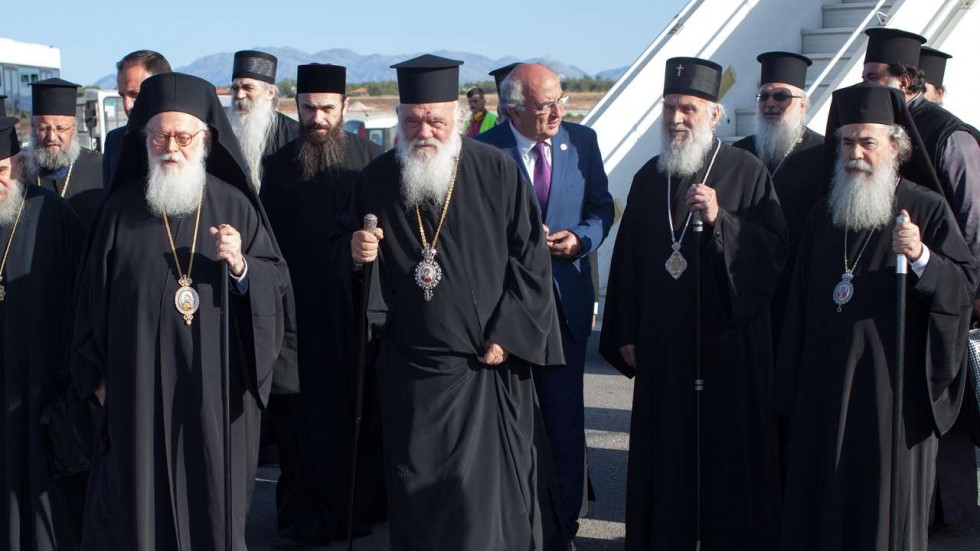
The Great Council of the Eastern Orthodox churches has come and gone without much fanfare, let alone media headlines, but the week-long gathering of prelates from around the world in late June did reveal fissures and fault lines that will shape the Orthodox future. The Great Council, held in Greece and planned for over a century, had not been previously held for a thousand years due to the schism between Catholicism and Orthodoxy and subsequent social and political upheavals and obstacles to Orthodox unity. For many observers, the refusal of several bishops (from the Russian, Georgian, Bulgarian, and Antiochian churches) to attend the council became part of a plot line involving rivalry, competition, and the growth of fundamentalism and traditionalism in world Orthodoxy. At a call-in conference run by the Council of Foreign Relations, political scientist Elizabeth Prodromou said the narrative about rivalry for dominance in the Orthodox world between the Ecumenical Patriarch, historically the “first among equals” in Orthodox leadership, and the Moscow Patriarchate of the Russian Orthodox Church led the media coverage of the event, particularly over the concern about whether the former would exercise pope-like authority.
Prodromou says this narrative was first “laid out by the Moscow Patriarchate and more specifically the Putin government…. That the church has been able to exercise leverage over the other three who didn’t come [is] also very much related to Russia’s geopolitical objectives in Europe and Eurasia….” That the council spoke out forcefully against religious nationalism did not please the Russian state, but the Russian church is limited in maneuvering within such an authoritarian polity, she adds. The council showed the Orthodox churches in Cyprus and Albania among the most open on a range of issues, particularly the relation of Orthodoxy and democracy. In fact, it was the bishop of Cyprus who said at the close of the council that the “single greatest challenge” to unity and progress within the Orthodox Church is “fundamentalism.” Several other church leaders and observers have targeted Orthodox fundamentalism as hampering the work of the recent council. RW attended a conference at Fordham University in New York in late June that specifically sought to define Orthodox fundamentalism and come up with a response to the phenomenon. The dilemmas of defining and applying the elusive concept of fundamentalism to Orthodox churches marked many of the presentations.
Quinceanera, the coming of age ceremony for 15-year-old Latina girls in the U.S., is becoming more secular, coming to resemble Jewish bat mitzvah ceremonies, reports the New York Times (June 5). Traditionally, the quinceanera combined a birthday party with a rite-of-passage into womanhood for teenage Latinas, but it also had strong religious overtones, including a […]
New Amish groups are being established in non-traditional ways outside of the faith’s heartland in Pennsylvania and the Midwest, according to an article in the Washington Post (June 25). Two small South American settlements were both founded last fall after longstanding Mennonite communities in those countries reached out to North American Amish to explore affiliation, […]
First- and second-generation members of new religious movements (NRMs) experience similar conflicts when they leave these groups, although the latter find it much more difficult to exit and build new lives, according to a study in the Journal of Religion & Society (Vol. 18, 2016). Most of the information on ex-members of NRMs has focused […]
About 40 million of the 200 billion messages sent on Twitter last year consisted of Bible verses, with a high percentage of senders being either an elite group of religious leaders or “bots,” programs designed to create their own tweets, according to Christianity Today (June). The top two Bible passages are the favorites of evangelicals: […]
The future of public funding or support of religion in Europe is likely to become increasingly linked with its potential for positive contributions to society, according to several articles in the inaugural issue of the new French-language journal on religion and law, the Revue du Droit des Religions (May). The European Court of Human Rights (ECHR) […]
Even as terrorists from Central Asia have taken the spotlight for their recent part in the Islamic State’s attack in Istanbul in late June, the region is seeing the emergence of “Islamo-democrats” who are challenging the influence of political Islam. The Journal of Muslim Minority Affairs (Vol. 36, No. 2) reports that the growth of […]
The Sectarianism of the Islamic State, published last month by the Carnegie Endowment for International Peace, presents a thorough examination of the tangled roots of the ideologies and theologies that make up this unorthodox and lethal jihadist movement (whatever the secular motivations of its fighters). Hassan Hassan, author of the report, stresses that while the […]